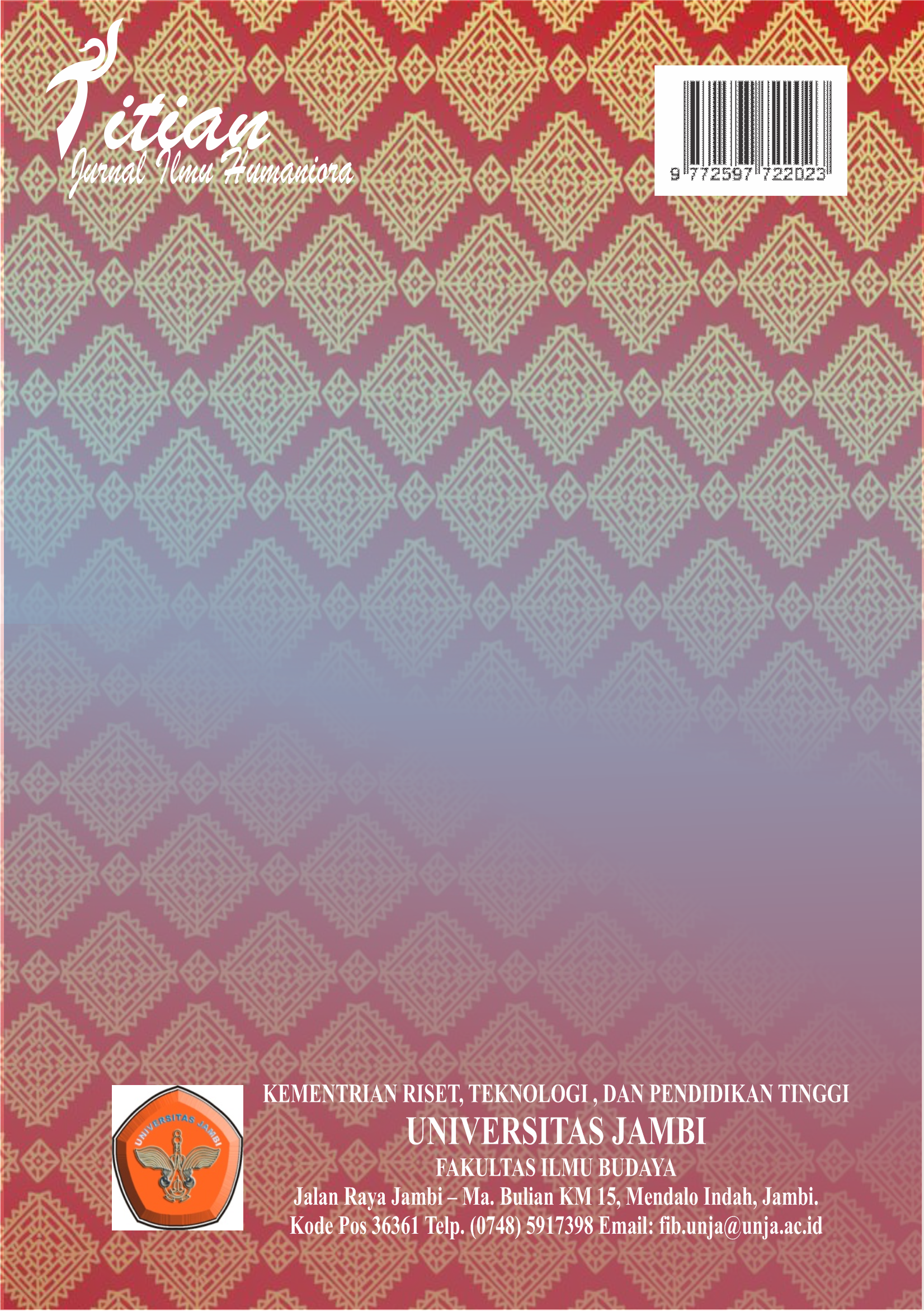Women Empowerment in Little Mix's “Saluteâ€: Feminist Stylistic Analysis
DOI:
https://doi.org/10.22437/titian.v7i2.29556Keywords:
Feminist Stylistics, Women Empowerment, AnalysisAbstract
This study conducts a feminist stylistic analysis of Little Mix's song "Salute" within the theoretical framework proposed by Sara Mills. Utilizing Mills's three-level structure outlined in "Feminist Stylistics", the study employs a descriptive-qualitative methodology inspired by Creswell's theory. The primary focus is to explore the representation of women's empowerment in the song. Analysis occurs at the levels of word, phrase/sentence, and discourse, connecting linguistic choices to feminist themes. The word-level analysis uncovers generic pronouns and nouns such as "you," "we," "ladies," "women," "sisters," "warriors," and "queens," emphasizing a collective female identity. At the phrase level, nine metaphors and three transitivity processes (material, mental, and relational) highlight the multifaceted aspects of empowerment. Discourse-level analysis reveals characterization and focalization, providing deeper insights into the characters' perspectives in the song. Overall, the linguistic choices in the song, as identified through the three-level analysis, consistently align with feminist principles, emphasizing women's empowerment as a central theme.
Abstrak
Penelitian ini melakukan analisis gaya feminis terhadap lagu "Salute" oleh Little Mix dalam kerangka teoritis yang diusulkan oleh Sara Mills. Dengan menggunakan struktur tiga tingkat Mills yang diuraikan dalam "Feminist Stylistics", penelitian ini mengadopsi metodologi deskriptif-kualitatif yang terinspirasi oleh teori Creswell. Fokus utamanya adalah untuk mengeksplorasi representasi pemberdayaan perempuan dalam lagu tersebut. Analisis dilakukan pada tingkat kata, frasa/kalimat, dan wacana, menghubungkan pilihan linguistik dengan tema feminis. Analisis tingkat kata mengungkapkan kata ganti dan kata benda generik seperti "you," "we," "ladies," "women," "sisters," "warriors," dan "queens," menekankan identitas perempuan kolektif. Pada tingkat frasa, sembilan metafora dan tiga proses transitivitas (material, mental, dan relasional) menyoroti berbagai aspek pemberdayaan perempuan. Analisis tingkat wacana mengungkapkan karakterisasi dan fokalisasi, memberikan wawasan lebih mendalam ke dalam perspektif karakter dalam lagu. Secara keseluruhan, pilihan linguistik dalam lagu, seperti yang diidentifikasi melalui analisis tiga tingkat, secara konsisten sejalan dengan prinsip feminis, menekankan pemberdayaan perempuan sebagai tema utama.
Downloads
References
Ayustin, E., & Christin, M. (2022). Sara Mills Model Critical Discourse Analysis on the Peaky Blinders Serial. Budapest International Research and Critics Institute-Journal (BIRCI-Journal), 5(3).
Batliwala, S. (1993). Empowerment of women in South Asia. Asian-South Pacific Bureau of Adult Education and FAO's Freedom from Hunger campaign/Action for Development.
Creswell, John W. (2009). Research Design: Qualitative, Quantitative, and Mixed Methods Approaches. Newbury Park: Sage Publications.
Coates, J. (2013). Women, Men and Language: A Sociolinguistic Account of Gender Differences in Language. 3rd edition. London: Routledge.
Delmar, R. (1986). What Is Feminism? In Juliet Mitchell & Ann Oakley (eds.) What Is Feminism?. New York. Pantheon Books.
Delmar, R. (2018). What is feminism?. In Theorizing feminism (pp. 5-28). Routledge.
Halliday, M. A. K. (2000). An Introduction to Functional Grammar (2nd ed.). Beijing: Foreign Language Teaching and Research Press.
Halliday, M. A. K., & Matthiessen, C. (2004). An introduction to functional grammar (3rd ed.). London: Edward Arnold.
Hussain, A. N., & Jabeen, T. (2019). A Feminist Stylistic Analysis of “Broken Verses†by Kamila Shamsie. International Journal of English Linguistics, 9(6), 214-225. 10.5539/ijel.v9n6p214
Kanwal, S. (2022). A Feminist Stylistic Analysis of Aysha Baqir’s Beyond the Fields. Panacea Journal of Linguistics & Literature, 1(1), 32-44. 10.59075/pjll.v1i1.136
Kenen. N. D. Feminism Dimension and Linguistic Expression in The Last of the Strong Ones.
Lakoff, G., & Johnson, M. (2008). Metaphors we live by. University of Chicago Press.
Li, M. X. (2006). Functional Grammar: A Course Book. Beijing: Foreign Languages Press.
Mills, S. (1995) Feminist Stylistics. London: Routledge.
Mills, S. (2005). Feminist Stylistics. 2nd edition. London: Routledge.
Robertson, J. (2019). Feminism Through the Ages: Making Waves. In Conference: Sociological Foundations of Thought.
Shapiro, B. (2017). Examining Portrayals of Female Protagonists by Female Screenwriters Using Feminist Critical Discourse Analysis. The Young Researcher, 1(1), 37-47.
Simpson, P. (2004). Stylistics: A resource book for students. Psychology Press.
Yazid, T. P., Suryana, A., Sugiana, D., & Yulianita, N. (2019). Women Representation In Lyric Of Minang Song “Laki Den Hobi Baburuâ€. Library Philosophy and Practice, NA-NA.
Downloads
Published
How to Cite
Issue
Section
License
Copyright (c) 2023 Chairinnisa Artanti, Adristi Yajna Zulaika, Rahmadsyah Rangkuti

This work is licensed under a Creative Commons Attribution-ShareAlike 4.0 International License.































